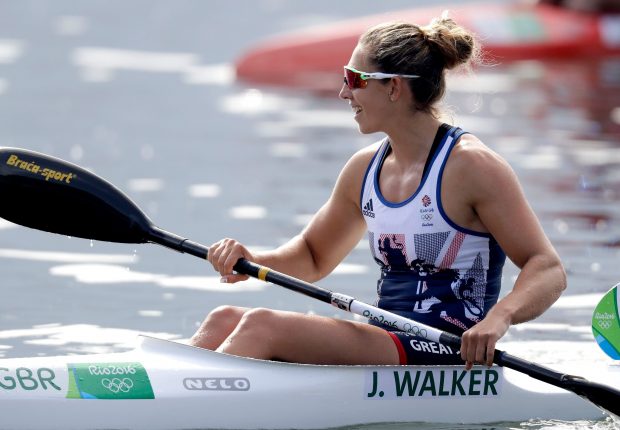There is not a boat in sight on a bleak, miserable day at The Royal Canoe Club in Teddington. Heavy rain thrums down on the roof of the clubhouse. Through the foggy French windows, you can just about make out the dreary looking Thames water in the distance.
It looks beyond uninviting, but for three-time Olympian sprint canoeist Jess Walker, it is just another day at work.
Growing up in Hampton Hill, Walker has endured endless early starts in cold water since she found her love for kayaking at the age of 10. Two decades on and she is now the fastest British woman on flatwater and has represented her country at Beijing, London and Rio. But she is yet to get her hands on a coveted Olympic medal.
Great Britain have enjoyed their fair share of Olympic success on boats over the years, but while the men have notched 16 medals in total in the sport, a medal in the sprint still eludes the women – the only one in canoeing coming in 2004 when Helen Reeves claimed bronze in the K1 slalom.
After failing to qualify for Tokyo at the World Championships in Hungary last year, Walker will have to wait until the qualifiers in May to discover her fate. Should she make the cut, the 29-year-old will be hoping to improve on her experience at Rio, which she claims was her least favourite experience at the Games.
“We didn’t have the best four years leading into it. I expected by then to have stepped up another level and I didn’t feel like I had.
“I wasn’t quite where I wanted to be when I got there. There was a lot of challenges in those four years, so I was just happy to get there.”
The ultimate goal
It is much clearer now what Walker has her eyes set on: “My goal is to win an Olympic medal in the K1 200, so then I’d be the first female British kayaker to win an Olympic medal. I really want to show that it is possible.”
Given the triumphs of British women rowers at the games in recent years, it is surprising that a similar level has not been matched by those travelling forwards in the water.
“I think that girls and women put limits on themselves so I would like to prove that it is possible,” said Walker, who has also been studying to be a Pilates teacher.
“It’s hard sometimes for girls because the sport can be like a man’s world. The information on training and all of that was originally all on men. It’s only now that we’re starting to get more information on women because they have collected enough data.
“I think over the last 10 years I have learnt to do it myself. Rather than the data being given to me, I had to learn it myself.”
A gender imbalance?
The difference in Olympic accomplishment between the two genders is stark. Although Walker claims the talent has always been there for the women, she puts the disparity down to a number of reasons.
“I think the way in which women in sport are treated is different to men. If it’s male coaches and male management then they’ll talk to you and manage you like men, but actually men and women are managed differently.
“I think the hockey women’s team got it right. Their coach learnt that they were a group of women, not a group of men and their motivations are different, especially in a team.”
With campaigns such as This Girl Can aimed at young female athletes, wider progress in the sport is just starting to be made according to Walker.
“In our sport our shoulders and arms get really big and so I think that this can put girls off. I’d like to see that mindset changed.
“But I think there is more awareness about it now. I think people are less likely to make fun of girls if they had big arms.
“People would comment on mine but I didn’t really care. Because I understand why I have got them and if women can build muscles, then why not?”
“It’s definitely changing now for sure, especially through social media,” said Walker, when casting her mind back to her adolescent years.
When I was a teenager, you wouldn’t have been able to see that other people were doing the same thing – that it is a strength and it is seen as being a beautiful thing.”
The next step
Not only is Walker the fastest in the sprint, but at 18 years old, she remains the joint youngest woman ever to compete in flatwater racing at the Olympics and was the also youngest member of the canoe sprint team at both Beijing and London.
Even with her wealth of experience, Walker’s work is far from done – she does not turn 30 until June and seemingly has a lot left in the tank. Canoeists and kayakers often do not reach their peak until their late 20s and 30s, as shown by men’s World and Olympic champion Liam Heath, who is now 35 and will be taking part once again at Tokyo.
“It’s difficult to decide when to stop because if you’re still improving, you’re thinking ‘what else can I do?’
“I’m still progressing. Between London and Rio I didn’t make any improvements which was really frustrating and I felt like I’d missed a really important development in that time.”
The future of the sport
Like in other minor sports which receive little media attention, canoeists are shown glimpses of quadrennial interest by the public after the flame is lit. For Walker, this is still a strange experience and something that she hopes will change in the future.
“People don’t see the athletes’ journey they just think they went to the Olympics. But they don’t realise that there was a four-year process or possibly longer
“Suddenly people are interested in what you’re doing and you’re like ‘well there was a journey to this.’
“I hope it will be exposed more in the media and then people will see that it’s fun and interesting to do – that you can succeed if you work hard in it and it is a good journey to go on.”
At the oldest canoe club in the UK, Jess sits alongside fellow member Tim Brabants MBE on the club’s ‘Hall of Fame’ list. A man who competed in four Olympics and won one gold and two bronzes, Brabants set the bar for the next generation of male athletes to succeed. Perhaps now it is Walker’s time to do just the same for the women.





